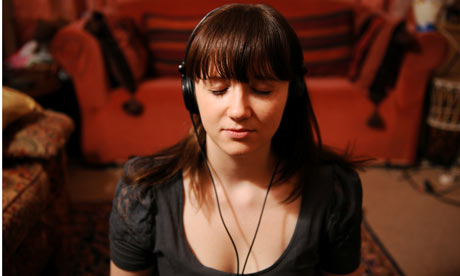
I am what is known, in official terminology, as a stresspot. Nothing is too big, or too small, to get me in a flap: deadlines; tube delays; the election. So I was intrigued, earlier this month, to see new research (from Seattle's Group Health Centre for Health Studies) showing that cheap, DIY relaxation techniques can reduce anxiety just as effectively as expensive massages. Could such simple exercises really help a worry merchant like me? I resolved, over five days, to give some a whirl.
Deep abdominal breathing ★★★★★
Neil Shah, a psychotherapist and founder of the Stress Management Society (SMS), says that "breathing from your stomach" is one of the best ways to reduce stress. He tells me to imagine a triangle running from my belly button to my hips, with a balloon inside; every time I take a breath, I should imagine the balloon inflating. At least five minutes a day, he says, will send more oxygen to my blood, reducing the effects on my body of the fight-or-flight mode that stress evokes.
I try this during my morning commute, which involves two packed trains. It feels unnatural at first, and I'm sure people are noticing – so I close my eyes, and by the time I get off the first train I'm infused with an unexpected sense of beatific calm. At work, I pop to the loo every so often to breathe deeply. By evening, my mind is calmer and my pulse slower; I feel different, more equable.
Meditation ★★★★☆
If deep breathing alone can make me calm, could meditation take me even further? To learn a simple, mantra-free technique I visit Andy Puddicombe, a former Buddhist monk who is setting up a charity called Headspace, with the aim of enabling anyone to learn to meditate, for free.
I sit on a comfortable chair, back straight, feet flat on the floor, eyes closed and he asks me to take five deep breaths; then to focus on each part of my body in turn. I'm then to return to thinking about breathing, before allowing my mind free rein, to be as busy or still as it wants (by now, it's remarkably still).
When I open my eyes after 15 minutes, I feel as if I've had a nap. When I try it alone at home, it's harder to focus at first – but after five minutes, the day's stresses melt away.
Positive thinking ★★★☆☆
Ann McCracken, a psychotherapist and chair of the UK arm of the International Stress Management Association, suggests a few simple techniques, derived from cognitive behavioural therapy, to tackle negative modes of thinking. I'm to note each time I say "should", "have to", and "must", and then change them – either mentally, or in writing – to "could". And when I say "what if", "perhaps", or "maybe", I'm to think about the projected worries that lie behind the words, decide whether I can do anything about them and, if not, place them in a mental box.
This proves challenging. While "I should lose weight" shifts easily to "I could lose weight" (who really cares whether I do or not?), "I have to go to work", is surely non-negotiable. Perhaps this is more of a long-term project.
Visualisation ★★★★☆
For counsellor Tina Greenhill, imagining relaxing on a beach is one of the most effective ways to reach a calmer state of mind. "A lot of the time our mind uses negative images that work against us," she says, "but we can use imagery in a positive way."
But I'm not confident about just lying back and trying to picture my last holiday: I anticipate pesky worries about bank statements creeping in. So Greenhill recommends recording a couple of visualisation scripts (titles include "the forest" and "the globe of light") in The Anxiety and Phobia Workbook (New Harbinger, £22.99). I go for "passive muscle relaxation" followed by "sunlight meditation", record them into my mobile phone, then put on headphones and settle back on the sofa. Amazingly, I quickly forget that it's my own voice instructing me to relax each part of my body, and am soon imagining I'm in a beautiful place with warm sunlight streaming down on me.
Relaxation CD ★★☆☆☆
The SMS recommends a CD called Stress Reduction and Relaxation (£11.99). The recording promises to relax me using "neuro-linguistic programming" and "binaural beats" which are "very subtle frequencies", says Shah, "that trick you into relaxation."
What I hear, however, is a strange wash of new age, electronic muzak, overlaid by a deep, male voice telling me, ominously, that these "binaural rhythms are harmonising with the theta waves within your brain".
Self-consciousness creeps in and I want to laugh. When the voice tells me to bring my mind to my "third eye. . . your gateway into a magical world of your own creation", I'm laughing so much that I do feel relaxed – but presumably not in the way the CD intended.

